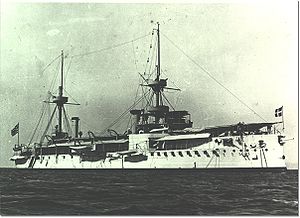Hydra class battleship

Idra
|
|
| Class overview | |
|---|---|
| Name: | Hydra class |
| Builders: | France |
| Operators: |
|
| Building: | 1885–1892 |
| Completed: | 3 |
| Retired: | 3 |
| General characteristics | |
| Type: | Ironclad |
| Displacement: | 4,808 t (4,732 long tons; 5,300 short tons) |
| Length: | 334 feet 8 inches (102.01 m) |
| Beam: | 51 ft 10 in (15.80 m) |
| Draft: | 18 ft (5.5 m) |
| Propulsion: |
|
| Speed: | 17 knots (31 km/h; 20 mph) |
| Crew: | 400 |
| Armament: |
|
| Armor: |
|
The Hydra class of ironclads composed three ships, Hydra, Spetsai, and Psara. The ships were ordered from France in 1885 during the premiership of Charilaos Trikoupis, as part of a wider reorganization and modernization of the Greek armed forces, which had proved themselves inadequate during the Cretan uprising of 1866. Launched in 1889 and 1890, the ships were ready for service with the Greek Navy by 1892. They were armed with a main battery of three 10.8-inch (274 mm) guns and five 5.9-inch (150 mm) guns, and had a top speed of 17 knots (31 km/h; 20 mph).
The ships frequently served together throughout their careers. Their participation in the Greco–Turkish War in 1897 was limited due to intervention by the Great Powers. Modernizations in the 1890s and 1900s upgraded the ships' armament, but by the First Balkan War, they were too slow to keep up with newer vessels in the Greek fleet, particularly the armored cruiser Georgios Averof. They saw action at the Battle of Elli but were left behind due to their slow speed at the Battle of Lemnos. Thoroughly obsolete, the ships were reduced to secondary duties after the war and did not see active duty during World War I. The ships were intended to be sold in 1919, but were retained out of active service until 1929.
The Balkan crisis that started with the Serbo-Bulgarian War, coupled with Ottoman naval expansion in the 1860s and 1870s, prompted the Greek Navy to begin a rearmament program. In addition, the Greek fleet had proved to be too weak to effectively challenge Ottoman naval power during the 1866 Cretan Revolt. In 1885, Greece ordered three new ironclads of the Hydra class. The ships were ordered from the Graville and St. Nazaire shipyards in France during the premiership of Charilaos Trikoupis.
...
Wikipedia
